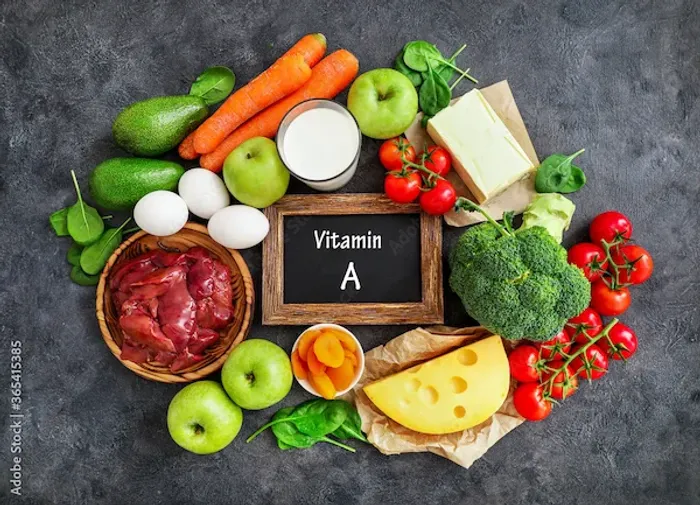Vitamin A's Role in Immune Health

Written by Dr. J T Hema Pratima
Reviewed by Dr. Dhankecha Mayank Dineshbhai MBBS
Last updated on 13th Jan, 2026

Introduction
A strong immune system is essential for fighting off infections and staying healthy. One key nutrient that plays a vital role in keeping your immune system in top shape is Vitamin A. But what exactly does Vitamin A do for your immunity, and how can you make sure you're getting enough? Let’s break it down in simple terms.
What is Vitamin A?
Vitamin A is a fat-soluble vitamin, which means your body stores it in fat tissues and the liver. It comes in two forms:
1. Preformed Vitamin A (Retinol) – Found in animal products like eggs, dairy, fish, and liver.
2. Provitamin A (Beta-carotene) – Found in colourful fruits and vegetables like carrots, sweet potatoes, spinach, and mangoes. Your body converts beta-carotene into active Vitamin A.
How Does Vitamin A Support Immunity?
Vitamin A is often called the "anti-infection vitamin" because it plays several crucial roles in immune function:
1. Maintains Healthy Skin and Mucous Membranes – Your skin and the lining of your nose, throat, and digestive tract act as barriers against germs. Vitamin A helps keep these barriers strong, preventing harmful bacteria and viruses from entering your body.
2. Supports White Blood Cells – White blood cells (like T-cells and B-cells) are your body’s defence soldiers. Vitamin A helps produce and regulate these cells, ensuring they can fight infections effectively.
3. Reduces Inflammation – Chronic inflammation weakens immunity. Vitamin A helps control inflammation, keeping your immune responses balanced.
4. Essential for Children’s Immunity – Kids need enough Vitamin A to develop a strong immune system. Deficiency can make them more prone to infections like measles and diarrhoea.
Consult Top Specialists for Personalised Tips
Signs of Vitamin A Deficiency
Not getting enough Vitamin A can weaken your immune system. Common signs include:
Frequent infections (colds, flu, respiratory illnesses)
Dry, rough skin or acne
Night blindness (difficulty seeing in low light)
Slow wound healing
Dry eyes or vision problems
Who is at Risk of Vitamin A Deficiency?
Certain groups are more likely to lack Vitamin A:
Pregnant and breastfeeding women (increased needs for fetal development)
Infants and young children (especially in developing countries)
People with digestive disorders (like Crohn’s or celiac disease, which affect nutrient absorption)
Those with a poor diet (low in fruits, vegetables, or animal sources of Vitamin A)
How to Get Enough Vitamin A
Vitamin A is found in many everyday foods. Here’s how to include it in your diet:
Animal Sources (Retinol – Active Vitamin A)
Liver (beef, chicken)
Fish (salmon, mackerel)
Eggs (especially the yolk)
Dairy (milk, cheese, butter)
Plant Sources (Beta-carotene – Converted to Vitamin A)
Orange & yellow veggies – Carrots, sweet potatoes, pumpkin
Leafy greens – Spinach, kale, collard greens
Fruits – Mangoes, apricots, cantaloupe
Red bell peppers & tomatoes
Tips for Better Absorption
The tips for better absorption include:
Pair Vitamin A-rich foods with healthy fats (like olive oil or nuts) since it’s fat-soluble.
Cooking vegetables (lightly steaming or roasting) can increase beta-carotene absorption.
Can You Take Too Much Vitamin A?
No! While deficiency is harmful, excess Vitamin A (especially from supplements) can be toxic. Symptoms include:
- Nausea, dizziness
- Blurred vision
- Bone pain
- Liver damage
Stick to food sources unless a doctor recommends supplements.
When to See a Doctor
If you experience frequent infections, vision problems, or suspect a deficiency, consult a healthcare provider. A simple blood test can check your Vitamin A levels.
Final Thoughts
Vitamin A is a powerhouse nutrient that keeps your immune defences strong. By eating a balanced diet rich in colourful fruits, vegetables, and animal sources, you can naturally support your immunity. If you’re at risk of deficiency, talk to a healthcare professional to ensure you’re getting the right amount.
Consult Top Nutritionists
Consult Top Specialists for Personalised Tips

Dr. Ramalinga Reddy
General Physician
5 Years • MBBS MD General medicine
Bengaluru
PRESTIGE SHANTHINIKETAN - SOCIETY CLINIC, Bengaluru
Dt. Ila Sharma
Clinical Nutritionist
18 Years • Master in food & Nutrition
Gurugram
VIPUL GREENS - SOCIETY CLINIC, Gurugram
Ms. Bhavana Shetty
Dietician
7 Years • DDHN & Masters in Clinical Nutrition & Dietetics
Bangalore
Apollo Sugar Clinic, Seetha circle bangalore, Bangalore

Dt. Prabhavathy
Clinical Nutritionist
8 Years • Msc Human Nutrition & Nutraceuticals
Madurai
Apollo Sugar Clinics, Madurai, Madurai
Dr Sumanth R
General Physician
2 Years • MBBS
Bengaluru
PRESTIGE SHANTHINIKETAN - SOCIETY CLINIC, Bengaluru


.webp)

